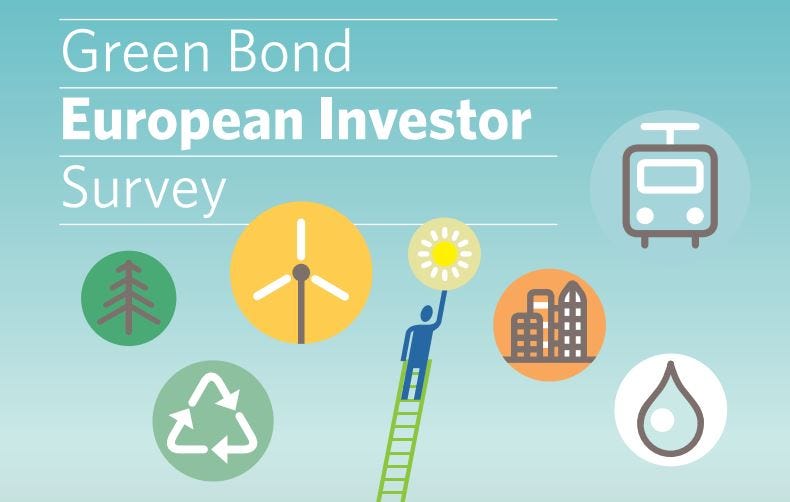Latest findings: New research, studies and papers
This week: Pricing in the green bond market, the science behind global environmental change, and civil society networks.

The Price of Going Green: The Role of Greenness in Green Bond Markets
Abstract: In this paper, we empirically investigate how greenness information is priced in the green bond market. Our comparison of liquidity‐adjusted yield premiums of green bonds versus synthetic conventional bonds indicates that, on average, there is no robust and significant yield premium or discount on green bonds. However, green bonds certified by an external reviewer enjoy a discount of about 6 bps. Furthermore, green bonds that obtain a Climate Bonds Initiative certificate show a discount of around 15 bps. The findings suggest that a universally accepted greenness measure can benefit the development of the green bond market.
Authors: Suk Hyun,Yonsei University; Donghyun Park, Asian Development Bank - Economic Research; Grace Tian, Asian Development Bank
A Primer on Global Environmental Change
Abstract: This paper sets out the science behind global environmental change, defined by the US Global Change Research Act as ‘changes in the global environment (including alterations in climate, land productivity, oceans or other water resources, atmospheric chemistry, and ecological systems) that may alter the capacity of the Earth to sustain life’. We explain why there is still skepticism about the science in the business world and introduce eight gestalt shifts that are likely to change how executives think about environmental change and the threats and opportunities such changes present. The paper concludes with future research directions on business and global environmental change and outlines how the business case for investment in clean technology means that the transition to clean tech is inevitable.
Authors: Martina K. Linnenluecke, Macquarie University; Tom Smith, Macquarie University, Macquarie Business School
The Future Trajectory for Environmental Finance: Planetary Boundaries and Environmental, Social and Governance Analysis
Abstract: Urgent issues such as climate change have drawn increasing attention from finance scholars. Most research has situated a corporate response within the context of the environmental, social and governance performance. However, other disciplines express concerns around environmental degradation within broader frameworks, such as the Planetary Boundaries framework. We highlight the different conceptualizations of ESG and planetary boundaries and call for further research that links finance research to the Planetary Boundaries framework. We describe how contributions in the Accounting & Finance Special Issue on Environmental Finance advance research in this area and explore implications for future research that responds to the imperatives of remaining within Planetary Boundaries.
Authors: Ashley Ding, Macquarie University; Dan Daugaard, Macquarie University, Macquarie Business School; Martina K. Linnenluecke, Macquarie University
Civil Society Networks and the Development of Environmental Standards at International Finance Institutions
Abstract: The article explores the role of civil society networks in the development of environmental and social standards and independent accountability mechanisms at the World Bank and other international financial institutions.
Author: David B. Hunter, American University - Washington College of Law
Drivers of Tight Carbon Control in the Context of Climate Change Regulation
Abstract: Our study examines the drivers of tight budgetary control in carbon management in the context of climate change regulation. Using the setting of New Zealand Emissions Trading Scheme (ETS), our study explores how firms manage their carbon performance using carbon‐focused budgetary control. Based on a survey data from New Zealand firms, including both those with and those without an ETS compliance obligations, our results suggest that economic and regulatory environmental pressures, the level of proactiveness of emissions management strategy, the level of integration of carbon issues in strategic and operational processes and the perceived importance of carbon issues are the significant drivers of tight carbon‐focused budgetary control.
Authors: Binh Bui, Victoria University of Wellington; Larelle Chapple, Queensland University of Technology - QUT Business School; Thu Phuong Truong, Victoria University of Wellington
The Unwritten Constitutional Principle of Ecological Sustainability: A Solution to the Pipelines Puzzle?
Abstract: This article explores whether recognizing an obligation of ecological sustainability as an unwritten constitutional principle (UCP) would assist government decision-makers and courts in addressing the many competing imperatives raised by the problem of petroleum pipelines. I argue that if the rule of law is the foundation of our society, then ecological sustainability is the bedrock on which it stands. Moreover, an ecological UCP would assist courts hearing pipeline-related disputes in interpreting environmental legislation, supervising the discretionary decisions of environmental regulators, adjudicating environmental claims under the Charter, and/or determining environmental powers under sections 91 and 92 of the Constitution Act, 1867. In particular, the UCP of ecological sustainability strongly militates in favor of upholding environmental legislation where there is even a slight jurisdictional toe-hold for the relevant level of government. The Article will also contrast how a sustainability analysis of pipelines differs from one grounded in the right to a healthy environment – the other major avenue for constitutional environmental protection. The Article concludes that while the right to a healthy environment arguably does not clearly resolve the pipeline puzzle (since such a right could equally be violated by alternative methods of transporting petroleum products, notable train transport), an unwritten constitutional principle of ecological sustainability points clearly to the need to divest from fossil fuel infrastructure and aggressively invest in renewables.
Author: Lynda Margaret Collins, University of Ottawa - Common Law Section
